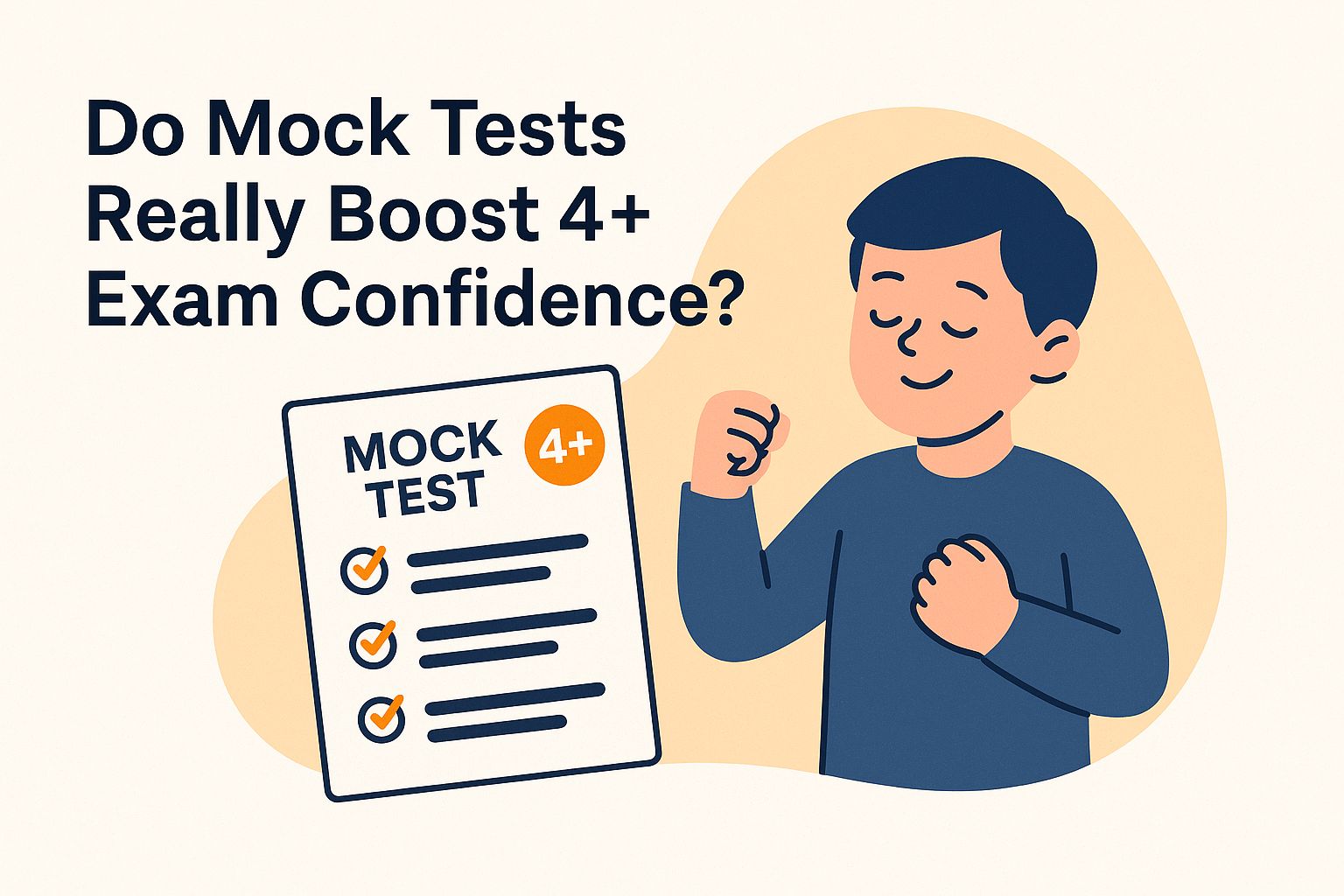
Do Mock Tests Boost 4+ Exam Confidence?
Feeling a little jittery about your child’s upcoming test? You’re not alone! Mock tests boost 4+ exam confidence, and that confidence can make all the difference in performance. By simulating real exam conditions, these practice sessions promise to build familiarity and reduce nerves, but do they really work?
We’ll delve into how mock tests familiarise children with the exam format, pinpoint knowledge gaps, and help them manage time effectively. Stick around to discover if these practice tests are the secret ingredient to exam success!
Overview of Exam Confidence
Exam confidence is essentially a student’s belief in their ability to excel in assessments, which has a significant impact on both their preparation and performance. This confidence can be seen in various forms, including reduced anxiety, improved focus, and proactive study habits.
For parents preparing their children for the 4+ exams, the best advice is to keep preparation light and child-friendly. At this age, confidence grows when learning feels playful rather than pressured. Reading stories together, encouraging curiosity with simple puzzles, and practising gentle mock-style questions in a relaxed setting can familiarise children with the exam environment without creating stress. Parents should focus on praise for effort, celebrating small wins, and keeping routines calm in the days leading up to the assessment. By doing so, children approach the 4+ with a sense of security and self-belief rather than anxiety.
In the long run, cultivating exam confidence can profoundly enhance a student’s academic experience by fostering consistent effort and resilience in the face of challenges.
Importance of Mock Tests
Mock exams are an invaluable resource for building exam confidence, enabling students to become familiar with test formats and alleviate anxiety. By simulating the exam environment, students can effectively identify their strengths and weaknesses.
To make the most of this advantage, it is advisable to incorporate mock exams into your study routine—scheduling them fortnightly as the exam date approaches.
Utilising resources such as Official Exam Guides or platforms like Khan Academy can greatly enhance your preparation, as they provide practice questions along with instant feedback. Additionally, exploring effective study techniques like active recall and spaced repetition can significantly improve retention and understanding.
By combining mock exams with these strategies, students can create a well-rounded preparation plan that sets them up for success.
Understanding Exam Confidence
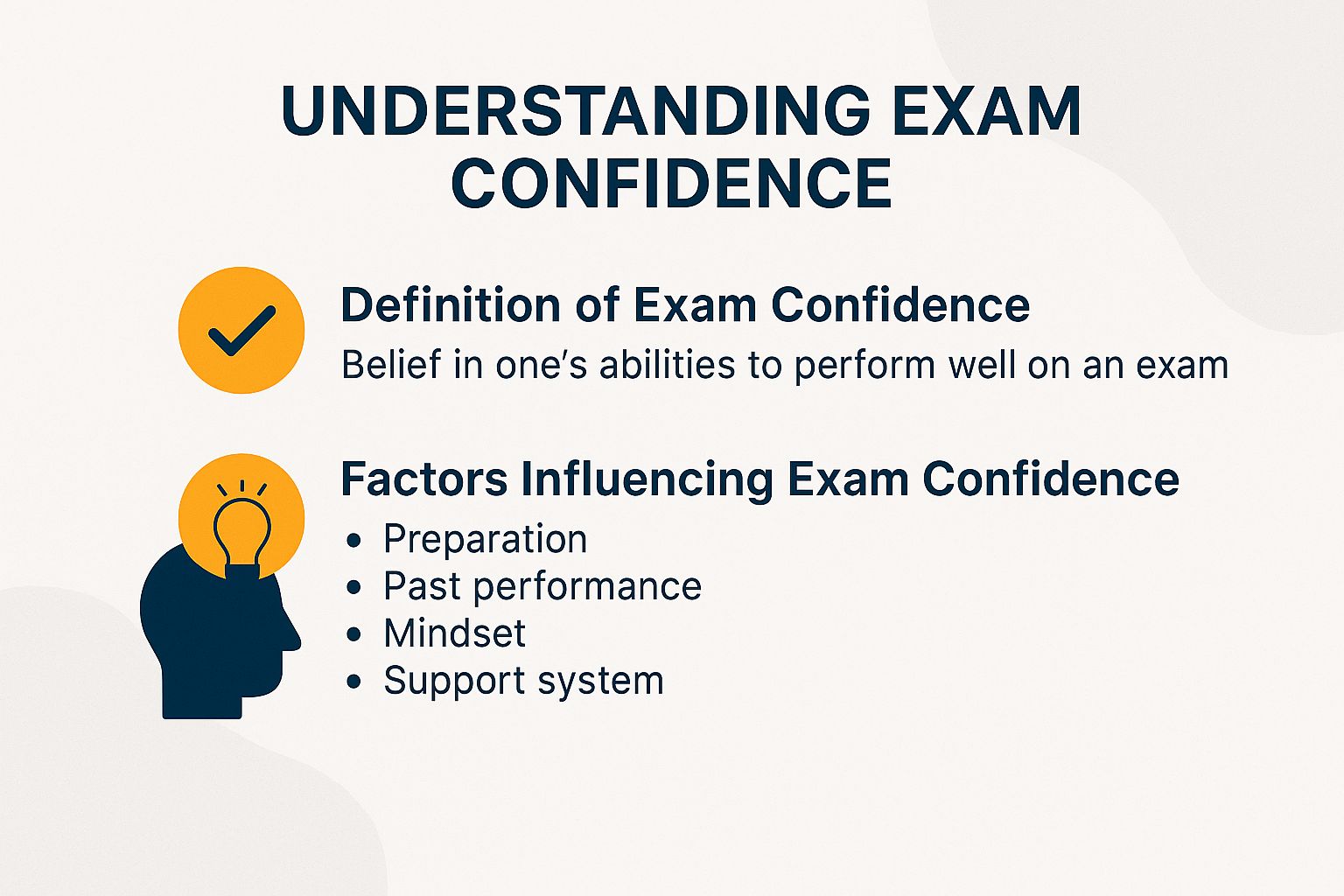
Exam confidence consists of various components that play a crucial role in shaping a student’s self-belief.
Understanding these intricate factors can help identify what contributes to building or diminishing this essential confidence. Worth exploring: Growth Mindset for Young Learners: Building Resilience for Exams, which discusses methods to foster resilience alongside exam confidence.
Definition of Exam Confidence
Exam confidence refers to the personal belief in one’s ability to perform well in a specific academic assessment. This confidence can have a significant impact on academic outcomes, influencing both exam performance and overall grades.
Students can enhance their exam confidence by employing several effective strategies:
- Using effective study techniques, such as spaced repetition and active recall, can improve information retention.
- Practising with past exam papers allows students to become familiar with various question formats.
- Using tools like Quizlet or Anki for flashcards can further support memory retention.
The implications of improved exam confidence extend beyond academics, leading to better stress management during exams and a greater likelihood of achieving desired qualifications. Ultimately, this contributes to both academic and professional success.
Factors Influencing Exam Confidence
Several key factors influence exam confidence, including prior academic success, study habits, and the ability to manage anxiety. For instance, previous academic achievements can act as a confidence booster; students who consistently perform well in their courses are more likely to feel assured during exams.
Additionally, effective study habits, such as employing spaced repetition or taking practice tests, can significantly enhance retention and reduce the need for last-minute cramming.
It is also important to manage anxiety through techniques like mindfulness or deep breathing exercises; students who can calm their nerves often achieve better performance during exams.
By combining these strategies into a comprehensive approach, students can experience notable improvements in their exam readiness.
The Role of Mock Tests
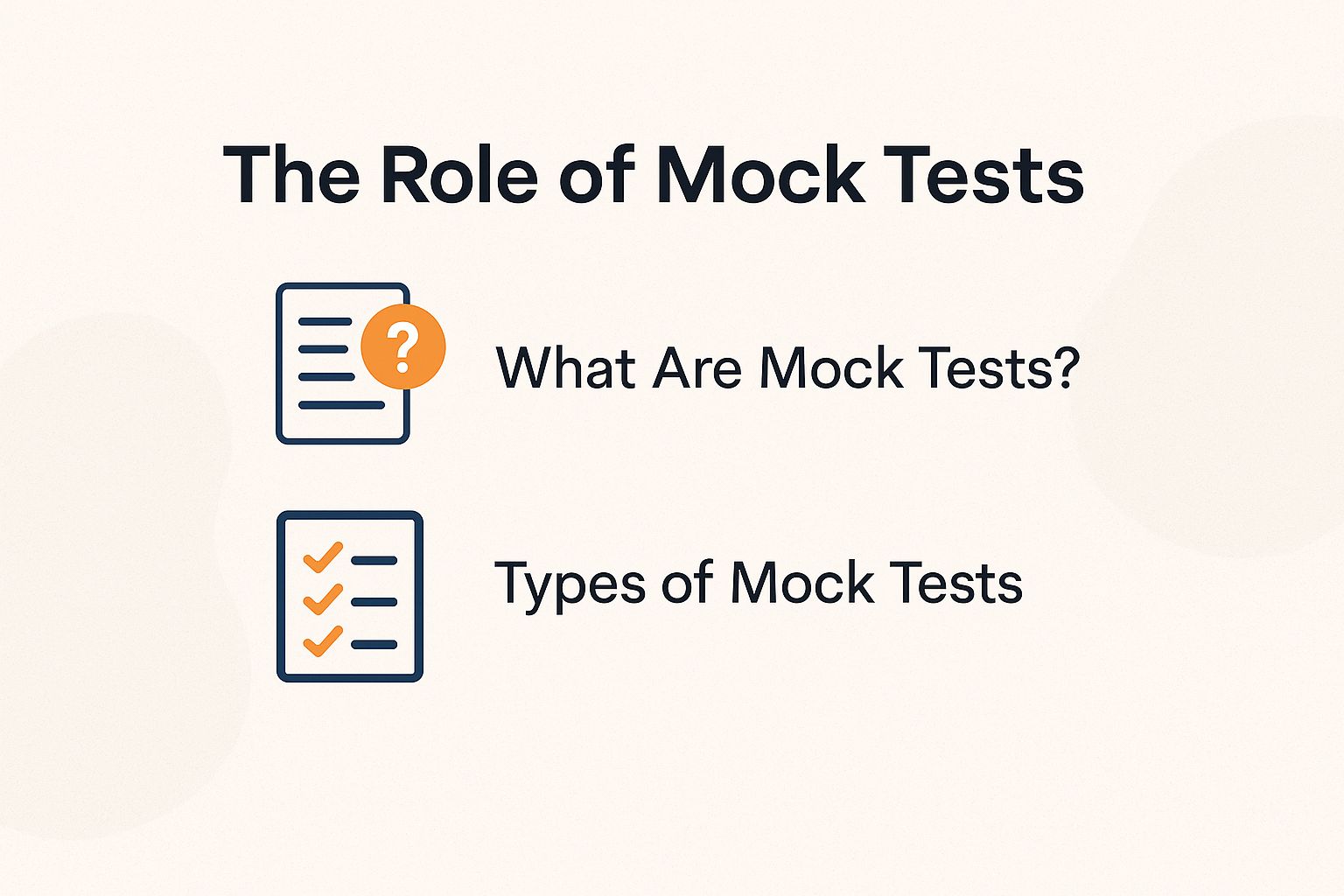
Mock tests are essential components of exam preparation. They simulate the actual testing environment and offer valuable feedback to students, helping them understand their strengths and areas for improvement. To maximise the effectiveness of these tests, it’s important to incorporate them into a comprehensive study plan. Curious about what should be in an 11 Plus study plan? This guide provides essential strategies for success.
What Are Mock Tests?
Mock tests are simulated examinations designed to closely replicate the structure and timing of actual assessments, providing students with an opportunity to evaluate their readiness. These tests play a crucial role in identifying both strengths and weaknesses, enabling students to focus their study efforts more effectively.
They can come in various formats, such as paper-based tests that resemble traditional exams or online quizzes that offer immediate feedback. Utilising tools like ExamSoft or Google Forms can help streamline this process, making it more efficient.
Reviewing answers after the tests is essential for deepening understanding, as it not only highlights the correct answers but also explains the reasoning behind them. By regularly incorporating mock testing into their study routine, students can significantly enhance their confidence and performance on the actual exam day.
Types of Mock Tests
There are several types of mock tests available, including formative assessments that concentrate on specific skills and standardised tests that replicate real exam conditions.
For example, formative assessments may consist of quizzes or short-answer tests aimed at particular concepts. These assessments allow students to evaluate their understanding and identify areas where they may need improvement.
Conversely, standardised tests, such as practice SATs, provide a realistic exam experience that helps students develop skills in managing their time and handling stress.
Additionally, adaptive mock tests adjust their difficulty level based on the answers provided, offering a tailored practice experience that can lead to improved outcomes.
Each format serves a unique purpose, enabling students to engage with their learning in a manner that aligns with their individual needs.
Benefits of Taking Mock Tests
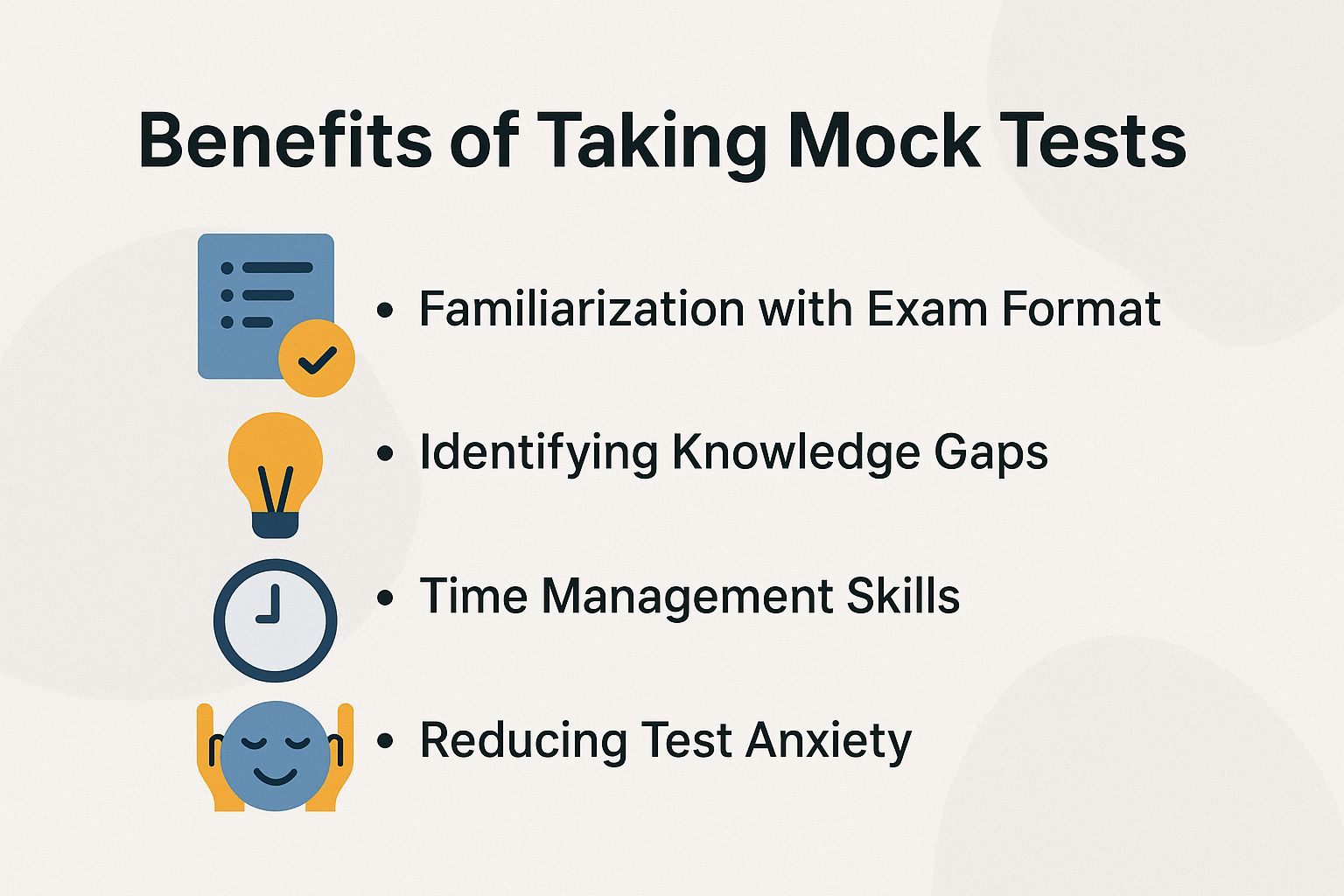
Participating in mock exams offers numerous advantages that can significantly enhance students’ readiness and confidence before their actual examinations. For those crafting their study plans, understanding what should be included can further bolster their preparation.
Learn more: Explore What Should Be in an 11 Plus Study Plan for effective strategies.
Familiarisation with Exam Format
One significant advantage of mock tests is their ability to familiarise students with the actual exam format, which helps to minimise surprises on test day. By participating in these practice assessments, students gain valuable insight into the exam’s structure, including the types of questions, timing, and difficulty levels they can expect.
For example, administering practice tests for standardised exams like the SAT or GRE can closely mimic the real exam’s pacing, typically allowing for around 25 minutes per section. Resources such as Khan Academy for SAT preparation and Magoosh for GRE preparation provide tailored mock exams, enabling students to identify their strengths and weaknesses effectively.
Furthermore, analysing the results immediately after completing a mock test allows students to focus on specific areas for improvement, ensuring they are better prepared as the actual exam date approaches.
Identifying Knowledge Gaps
Mock tests play a crucial role in identifying knowledge gaps, enabling students to direct their study efforts more efficiently. After reviewing the results of these mock tests, it is advisable for students to categorise their incorrect answers by subject or topic.
For example, if a student consistently finds difficulty with fractions in maths or with reading comprehension, they can prioritise these specific areas in their study plan.
Utilising tools such as Quizlet can aid in the creation of flashcards for essential concepts, while Khan Academy provides targeted exercises for further practice. It is beneficial to schedule focused study sessions—lasting between 30 to 60 minutes—on particular topics to reinforce learning.
Consistently revisiting these subjects will not only ensure gradual improvement but also help build confidence as students approach their actual exams.
Time Management Skills
Practising with mock tests greatly enhances time management skills, helping students learn how to allocate their time effectively during exams. To maximise the benefits of mock testing, students should consider several effective strategies.
- First, it is important to simulate real exam conditions by strictly timing oneself and using only the materials that are allowed.
- Next, prioritising questions based on their difficulty is key: tackling the easier ones first can help build confidence, followed by returning to the more challenging questions.
- Additionally, reviewing answers to identify patterns in mistakes is essential; using tools like Quizlet can be very helpful in reinforcing weak areas.
By incorporating these methods into your study routine, you can significantly improve both your pacing and accuracy on exam day.
Reducing Test Anxiety
Regularly taking mock examinations can significantly alleviate test anxiety, as students become more accustomed to the examination experience. By simulating the actual exam environment, students can practise time management and pinpoint areas where they may need improvement.
For example, utilising platforms such as Khan Academy or Quizlet provides students with access to a variety of practice questions tailored to their specific subjects. Establishing a schedule for these mock examinations—perhaps on a weekly or fortnightly basis—can help create a routine that fosters a sense of preparedness.
Additionally, engaging in discussions with peers after each examination can deepen understanding. This allows students to share strategies and insights, further boosting their confidence in their abilities.
Research on Mock Tests and Confidence
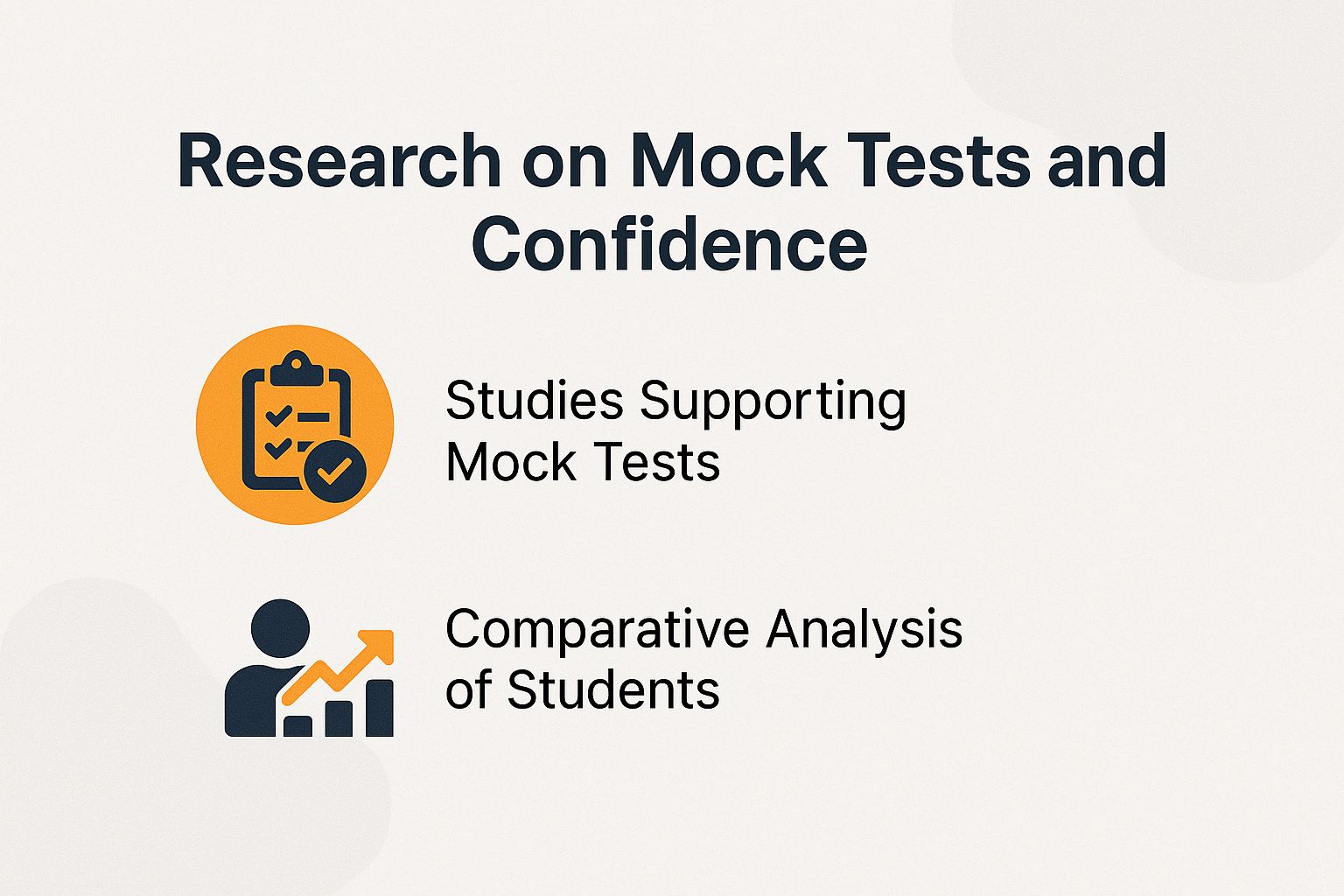
Extensive research indicates that mock examinations are quite effective in enhancing confidence and improving overall academic performance.
Engaging in these practice assessments provides students with valuable insights into their strengths and areas for improvement, ultimately leading to better preparation for actual exams. If you’re interested in exploring additional resources, you might find our discussion on AI tools for 11+ entrance exams insightful, particularly as it relates to leveraging technology to boost exam readiness.
Studies Supporting Mock Tests
Numerous studies indicate that students who participate in mock examinations tend to score, on average, 15% higher in their actual exams. One effective way to implement mock examinations is by utilising online platforms such as Quizlet or Khan Academy, which provide customisable quizzes tailored to specific subjects. Teachers can schedule these examinations throughout the term to reinforce students’ learning.
Research also shows that students who take the time to review their mistakes after each mock examination can significantly increase their retention rates. Additionally, setting a timer during these examinations simulates real exam conditions, assisting students in managing their time effectively and reducing anxiety during actual assessments.
Comparative Analysis of Students
A comparative analysis indicates that students who regularly engage in mock examinations significantly outperform their peers who do not participate in such practices across a range of subjects.
When examining data from various student groups, distinct trends become apparent. Students who participate in weekly mock examinations achieve, on average, scores that are 15% higher in subjects like maths and science compared to those who only take examinations on a monthly basis.
Resources such as Quizlet and Khan Academy support this practice by offering customised quizzes and performance analytics. Additionally, implementing time management strategies—such as using a timer during mock examinations—can further enhance performance.
Thus, it is clear that consistent practice, combined with effective study tools, can substantially improve student success.
Strategies for Effective Mock Testing

Implementing effective strategies in mock examinations can significantly enhance the benefits, ultimately leading to better exam preparedness. For instance, understanding what should be in an 11 Plus study plan can provide students with a structured approach to their studies, ensuring comprehensive coverage of necessary topics.
Creating a Study Schedule
Developing a structured study schedule that includes mock tests can significantly enhance retention and improve time management skills. To create an effective study plan, begin by identifying your exam date and then work backwards from that point. It is essential to allocate specific times for each subject to ensure comprehensive coverage of all topics.
Incorporating mock tests every two weeks can help simulate exam conditions and allow you to assess your progress. For example, if you dedicate Mondays to studying biology, you might reserve the last hour of that day for a timed mock test.
Utilising tools such as Quizlet for flashcards and Google Calendar to block off study periods can be very beneficial. Additionally, it is important to schedule breaks to prevent burnout, aiming for 5 to 10 minutes of rest after every hour of study.
Analysing Mock Test Results
Carefully analysing mock test results enables students to identify their strengths and weaknesses, which in turn facilitates the development of targeted improvement strategies.
To start, it is important to track specific metrics, such as accuracy rates across different subjects, the time taken to answer each question, and the areas where mistakes occur most frequently. For instance, if a student scores 70% in maths but notices a significant drop in their performance on geometry questions, this clearly highlights the need for focused practice in that particular area.
Next, it is essential to translate these findings into actionable adjustments in study habits. This could involve creating a revised study schedule that allocates more time to geometry, as well as incorporating targeted resources such as online tutorials or practice quizzes.
Finally, regularly reassessing performance through subsequent mock tests will help monitor progress over time.
Common Misconceptions about Mock Tests
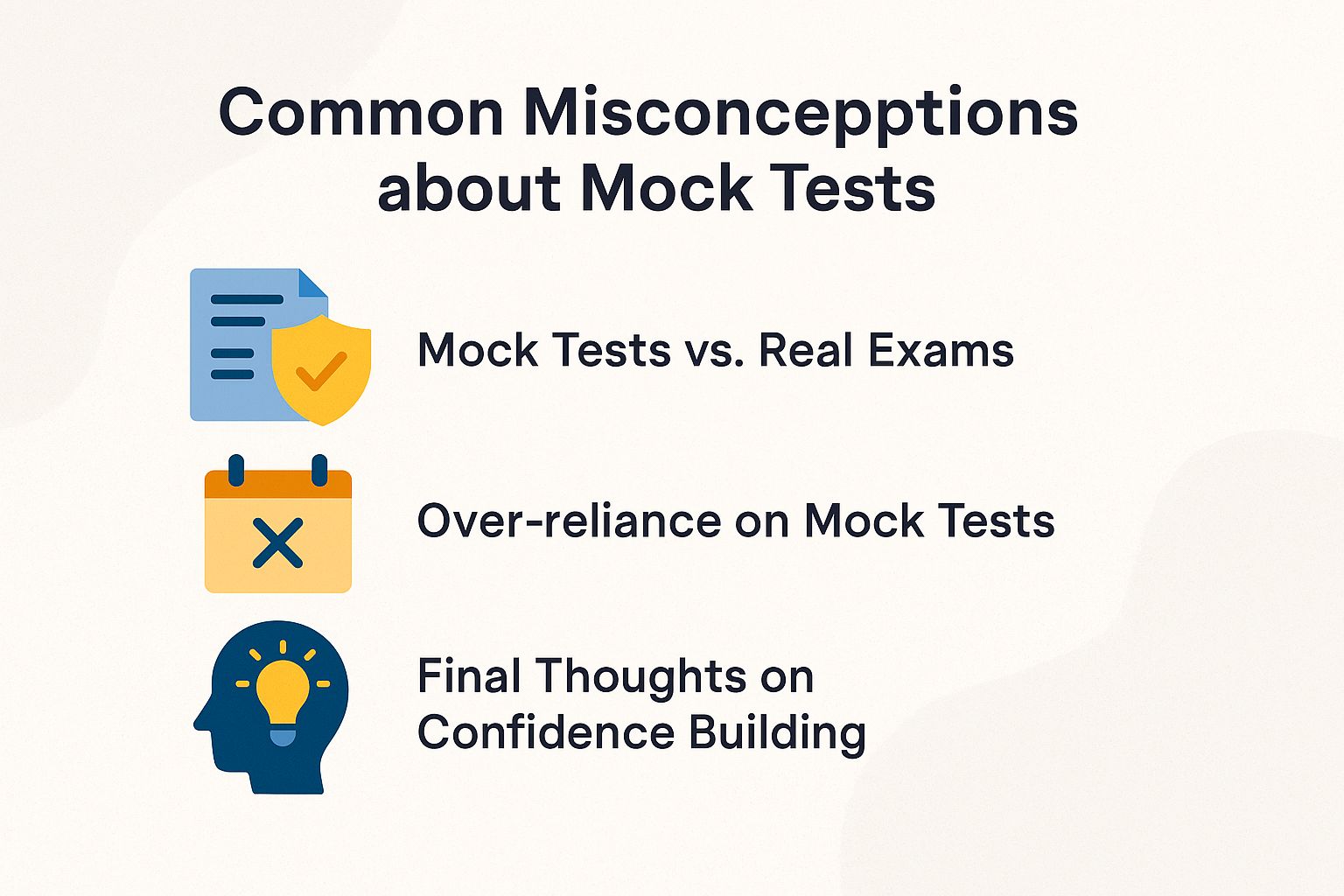
Despite the advantages they offer, there are several misconceptions about mock examinations that can undermine their effectiveness for students.
Mock Tests vs. Real Exams
There is a prevalent misconception that mock exams do not accurately represent actual examinations; however, they are designed to closely mimic the format and types of questions one is likely to encounter. In many cases, these mock exams are crafted by educators or examination developers to align closely with the curriculum.
For instance, standardised tests such as the SAT often provide practice exams that reflect the timing, structure, and question types of the real examination. Utilising resources like Khan Academy or official test preparation books offers candidates the opportunity to engage with authentic questions under simulated conditions.
By actively engaging with these resources, individuals not only become more familiar with the exam format but also can identify any gaps in their knowledge. This targeted approach to studying ultimately enhances confidence and preparedness for examination day.
Over-reliance on Mock Tests
Some students mistakenly think that relying solely on mock exams will guarantee their success, overlooking the importance of other essential study strategies. While mock exams do offer benefits such as becoming familiar with exam formats and improving time management skills, it is crucial for students to incorporate a variety of study methods into their preparation.
For example, combining mock exams with active recall techniques—like using flashcards—can significantly enhance memory retention. Additionally, implementing spaced repetition in their study routines can help counteract the forgetting curve over time; tools such as Anki are particularly effective for this purpose.
Participating in group study sessions also creates opportunities for discussion and clarification of challenging concepts. By balancing these strategies, students can ensure a more comprehensive understanding of the material, ultimately leading to improved exam performance.
Final Thoughts on Confidence Building
Ultimately, cultivating a resilient mindset through effective preparation methods, such as mock exams, can lead to greater levels of confidence during examinations.
Engaging in regular practice with mock exams significantly enhances academic performance while also alleviating anxiety. For instance, by scheduling weekly tests, students can identify their weaker areas and focus on improving in specific subjects.
Utilising resources like the Official ACT Prep Guide or Khan Academy’s SAT practice can offer customised questions and replicate real examination conditions. Taking the time to review mistakes in detail is crucial, as it helps in developing better strategies for addressing similar problems in the future.
This consistent practice not only transforms uncertainty into familiarity but also paves the way for a calmer and more prepared approach to actual examinations.
Frequently Asked Questions
1. Do mock tests boost 4+ exam confidence?
Yes, mock tests have been proven to significantly boost 4+ exam confidence. They provide a simulated experience of the actual exam, allowing students to become familiar with the format and types of questions, and identify their strengths and weaknesses.
2. How do mock tests help in building 4+ exam confidence?
Mock tests help build 4+ exam confidence by giving students the opportunity to practice and improve their test-taking skills. They also help in reducing anxiety and increasing familiarity with the exam, leading to a boost in confidence.
3. Are mock tests similar to the actual 4+ exam?
Mock tests are designed to simulate the actual 4+ exam as closely as possible. They are created using the same format, types of questions, and time restrictions, making them an accurate representation of the real exam.
4. How many mock tests should I take to increase my 4+ exam confidence?
The number of mock tests you should take depends on your individual needs and preferences. However, it is generally recommended to take at least 2-3 mock tests before the actual exam to see a significant improvement in your confidence.
5. Can mock tests help in identifying areas of improvement?
Yes, mock tests are an excellent way to identify areas of improvement. By taking these tests, you can see which topics or types of questions you struggle with the most and focus on improving them before the actual exam.
6. Are mock tests only beneficial for students who struggle with exams?
No, mock tests are beneficial for all students, even those who do well on exams. They provide a way to practice and refine test-taking skills, and can also help in identifying any gaps in knowledge that may need to be addressed before the actual exam.



